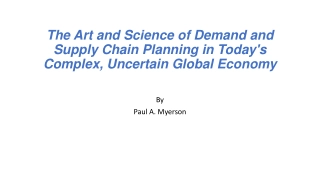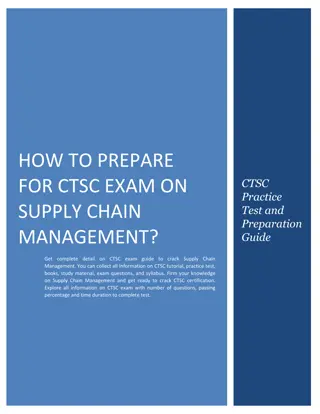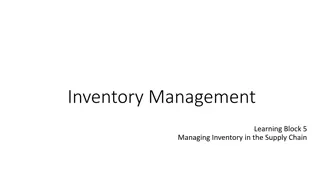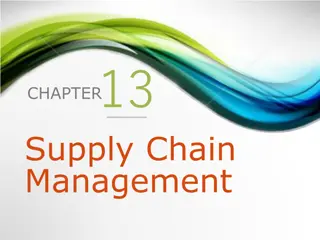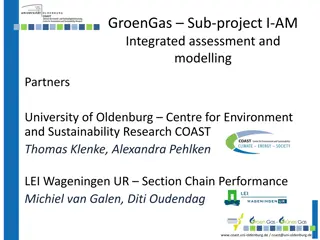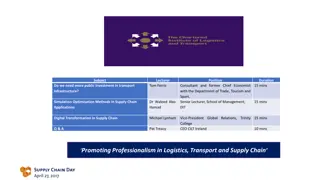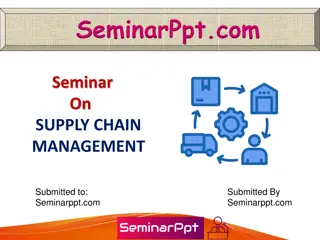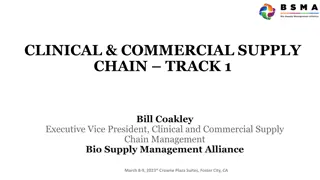
Supply Chain Management Capacity Building Programme
Established committee system for competitive bids in procurement, consisting of bid specification, evaluation, and adjudication committees. The committees ensure fairness, transparency, and compliance with regulations.
Download Presentation

Please find below an Image/Link to download the presentation.
The content on the website is provided AS IS for your information and personal use only. It may not be sold, licensed, or shared on other websites without obtaining consent from the author. If you encounter any issues during the download, it is possible that the publisher has removed the file from their server.
You are allowed to download the files provided on this website for personal or commercial use, subject to the condition that they are used lawfully. All files are the property of their respective owners.
The content on the website is provided AS IS for your information and personal use only. It may not be sold, licensed, or shared on other websites without obtaining consent from the author.
E N D
Presentation Transcript
SUPPLY CHAIN MANATEMENT CAPACITY BUILDING PROGRAMME CHERYL REDDY
COMMITTEE SYSTEM FOR COMPETITIVE BIDS 1 A committee system for competitive bids is hereby established, consisting of the following committees for each procurement or cluster of procurements as the accounting officer may determine: 1,1 a bid specification committee; 1,2 a bid evaluation committee; and 1,3 a bid adjudication committee; The accounting officer appoints the members of each committee, taking into account section 117 of the MFMA. A neutral or independent observer appointed by the accounting officer must attend or oversee a committee when this is appropriate for ensuring fairness and promoting transparency. The committee system must be consistent with paragraphs 24, 25 and 26 of this policy; and any other applicable legislation. The accounting officer may apply the committee system to formal written price quotations. 2 3 4 5
BID SPECIFICATION COMMITTEE A bid specification committee must compile the specifications for all procurement of goods or services by the municipality. The respective Deputy Municipal Manager must authorize the specification on the proposed specification document before that specification document is considered by the Bid Specification Committee Specifications 2,1 must be drafted in an unbiased manner to allow all potential suppliers to offer their goods or services; 2,2 must take account of any accepted standards such as those issued by Standards South Africa, the International Standards Organization, or an authority accredited or recognised by the South African National Accreditation System with which the equipment or material or workmanship should comply; 2,3 must, where possible, be described in terms of performance required rather than in terms of descriptive characteristics for design; 1, 2,
BID SPECIFICATION COMMITTEE 2,4 may not create trade barriers in contract requirements in the forms of specifications, plans, drawings, designs, testing and test methods, packaging, marking or labelling of conformity certification; 2,5 may not make reference to any particular trade mark, name, patent, design, type, specific origin or producer unless there is no other sufficiently precise or intelligible way of describing the characteristics of the work, in which case such reference must be accompanied by the word equivalent ; 2,6 must indicate each specific goal for which points may be awarded in terms of the points system set out in the Preferential Procurement Regulations 2001; and 2,7 must be approved by the accounting officer prior to publication of the invitation for bids in terms of paragraph 19 of this policy.
BID SPECIFICATION COMMITTEE 2,8 Proper Terms of Reference are drawn up for the service required clearly indicating the scope of the requirement, price and functionality criteria, the evaluation criteria as well as their weights and values; if and when applicable, in addition to the General Conditions of Contract, appropriate Special Requirements and Conditions of Contract are specified. The Bid Specification Committee should give careful consideration to the evaluation criteria to be stipulated in the bid document which includes, which is not exhaustive, pre- compliance, responsiveness criteria, mandatory functionality, functionality non mandatory weighted with threshold, price and B-BBEE point system. 3, A bid specification committee must be composed of one or more officials of the municipality, preferably the manager responsible for the function involved and may, when appropriate, include external specialist advisors. No person, advisor or corporate entity involved with the bid specification committee, or director of such a corporate entity, may bid for any resulting contracts.
BID EVALUATION COMMITTEE 1 A bid evaluation committee must 1.1 evaluate bids in accordance with i. the specifications for a specific procurement; and ii. the points system set out in terms of paragraph 24.2 f). 1,2 evaluate each bidder s ability to execute the contract; 1,3 check in respect of the recommended bidder whether municipal rates and taxes and municipal service charges are not in arrears for more than three (3) months; and 1,4 submit to the adjudication committee a report and recommendations regarding the award of the bid or any other related matter. A bid evaluation committee must as far as possible be composed of 2.1 officials from departments requiring the goods or services; and 2.2 at least one supply chain management practitioner of the municipality. 2
BID EVALUATION COMMITTEE If lowest acceptable bid received by the municipality are more than the budgeted amount (as per Financial Comment (FC)), BEC must recommend to the Municipal Manager to negotiate the final terms of a contract with bidders identified through a competitive bidding process provided that such negotiation- i. Does not allow any preferred bidder a second unfair opportunity: ii. Is not to the detriment of any other bidder: and iii. Does not lead to a higher price that the bid is submitted 3, In consultation with an expert in the relevant discipline or in comparison to a market related price. The negotiation will be limited as follows Range Range % Max Rand Max R200 001,00 R2 500 001,00 to to R2 500 000,00 R5 000 000,00 5 5 125 000,00 250 000,00 R5 000 001,00 to R7 500 000,00 5 375 000,00 R7 500 001,00 R10 000 001,00 R15 000 001,00 R20 000 001,00 R30 000 001,00 R50 000 001,00 R100 000 001,00 R150 000 001,00 to to to to to to to to R10 000 000,00 R15 000 000,00 R20 000 000,00 R30 000 000,00 R50 000 000,00 R100 000 000,00 R150 000 000,00 R200 000 000,00 5 5 5 5 5 1 1 1 500 000,00 750 000,00 1 000 000,00 1 500 000,00 2 500 000,00 2 500 000,00 2 500 000,00 2 500 000,00
BID ADJUDICATION COMMITTEE 1 A bid adjudication committee must consider the report and recommendations of the bid evaluation committee; and either depending on its delegations, make a final award or a recommendation to the accounting officer to make the final award; or make another recommendation to the accounting officer how to proceed with the relevant procurement. After the Bid Adjudication Committee approval or recommendation to the Municipal Manager, but before the award of a contract, the Municipal Manager will request the internal audit function to carry out audit procedures and provide an opinion on compliance of the bidding process with the Municipal Supply Chain Management Regulation. Where bids involve internal audit, the audit of the bidding process may be outsourced to an independent external service provider or internal audit function of another organ of state, subject to the oversight of the audit committee How often and when is this done by IA after every award or quarterly, need to inspect IA reports on any findings. What criteria or type of bid is it all bids or just or complex high value such as turn key,2 envelope system 1,1 1,2 i. ii. iii. iv. v. vi. vii.
BID ADJUDICATION COMMITTEE 2, A bid adjudication committee must consist of at least four senior managers of the municipality, which must include 2,1 the Deputy Municipal Manager Financial Services or, if the Deputy Municipal Manager Financial Services is not available, another manager in the financial services department reporting directly to the Deputy Municipal Manager Financial Services and designated by the Deputy Municipal Manager Financial Services; and 2,2 at least one senior supply chain management practitioner who is an official of the municipality; and 2,3 a technical expert in the relevant field who is an official, if such an expert exists. 2,4 A representative of the Bid Evaluation Committee, may be an observer 2,5 An official from the local municipality may be allowed to attend the Bid Awards Committee but only as an observer wherein an item pertaining to that local municipality shared service, Is to be awarded.
BID ADJUDICATION COMMITTEE 3 The accounting officer must appoint the chairperson of the committee. If the chairperson is absent from a meeting the deputy chair person will chair the meeting, should both the chair and deputy chair be absent the members of the committee who are present must elect one of them to preside at the meeting. Neither a member of a bid evaluation committee, nor an advisor or person assisting the evaluation committee, may be a member of a bid adjudication committee. If the bid adjudication committee decides to award a bid other than the one recommended by the bid evaluation committee, the bid adjudication committee must prior to awarding the bid 5,1 check in respect of the preferred bidder whether that bidder s municipal rates and taxes and municipal service charges are not in arrears; and 5,2 notify the accounting officer. 4 5
BID ADJUDICATION COMMITTEE 6 The accounting officer may 6,1 after due consideration the reasons for the deviation, ratify or reject the decision of the bid adjudication committee referred to in paragraph 26.5; and 6,2 if the decision of the bid adjudication committee is rejected, refer the decision of the adjudication committee back to that committee for reconsideration. The accounting officer may, at any stage of a bidding process, refer any recommendation back to that committee for reconsideration of the recommendation. The accounting officer must comply with section 114 of the MFMA (relating to approval of tenders not recommended) within 10 working 7 8
TERMS OF REFERENCE FOR BID COMMITTEES 1. PURPOSE These terms of reference serves to set out the basis for the establishment and functioning of the Bid Specification Committees (BSC) within King Cetshwayo District Municipality. 2. BACKGROUND AND LEGISLATIVE MANDATE OF BID SPECIFICATION COMMITTEES 2.1 The MFMA and Treasury Regulations prescribe that municipalities must ensure that the institution has and maintains an appropriate procurement and provisioning system which is fair, equitable, transparent, competitive and cost-effective. 2.2 The Act and Treasury Regulations empower the Municipal Manager to delegate powers or instruct any official within the municipality to perform any of the duties assigned to the Municipal Manager in terms of the Act. 2.3 Treasury Regulation 16A6.2 stipulates that an institution's supply chain system must, inter alia, provide for the adjudication of bids through a BSC, the establishment, composition and functioning of the BSC and the selection of BSC members.
TERMS OF REFERENCE FOR BID COMMITTEES 3. DUTIES AND POWERS OF COMMITTEE MEMBERS 3.1 3.1.1 Maintain order during a meeting and ensure that business is conducted in an orderly manner; 3.1.2 Before opening a meeting, ensure that it is properly constituted; 3.1.3 Protect the rights of every member; 3.1.4 Vacate his/her seat to the deputy chairperson, should he/she wishes to express an opinion that may not be regarded as impartial; 3.1.5 Regulate participation in discussions aimed at achieving consensus; 3.1.6 Deal with items in sequence of the agenda; 3.1.7 Ensure that members know exactly what they are required to vote on; 3.1.8 Ensure that only one member holds the floor at any one time; 3.1.9 Conduct meetings in a formal manner; and 3.1.10Formulate clearly the decisions to be minuted and sign and approve the minutes after they have been verified for correctness. The chairperson shall-
TERMS OF REFERENCE FOR BID COMMITTEES 3.2 Deputy Chairperson 3.2.1 The deputy chairperson has the same powers and duties as those of members and in addition, where necessary, shall- In the absence of the chairperson, preside as chairperson; and Take the seat of and act as chairperson, should the chairperson wish to express an opinion that may not be regarded as impartial. In the event that both the chairperson and deputy chairperson are absent from a meeting, the members present may elect one of their members to preside at such meeting 3.2.3 3.2.4 3.2.5
TERMS OF REFERENCE FOR BID COMMITTEES 3.3. 3.3. 3.3.1 Secretariat The Secretariat shall- In conjunction with the chairperson/deputy chairperson compile an agenda and determine dates of meetings; Give notice of proposed meetings to committee members; Process and distribute all submissions/reports together with the agenda to committee members at least twenty four hours before the actual meeting takes place; Minute all decisions taken at meetings; Adhere strictly to the stipulations of the National Archives of South Africa Act, No.43 of 1996 and accompanying directives; Ensure that the proceedings at mechanically/electronically; Give written feedback of all decisions taken by the committee; Be responsible for all the administrative tasks of the Committee; and Maintain a record file of all Bid Specification Committee meetings. 3.3.2 3.3.3 3.3.4 3.3.5 3.3.6 meetings are recorded 3.3.7 3.3.8 3.3.9
TERMS OF REFERENCE FOR BID COMMITTEES 3.4 3.4.1 3.4.1.1 Be fully conversant with the powers and limitations of the Committee as well as all directives pertaining to SCM, including the relevant sections of the Constitution, Municipal Finance Management Act and accompanying Treasury Regulations, Preferential Procurement Policy Framework Act, Broad Based Black Economic Empowerment Act and accompanying regulations, all directives issues by National Treasury/ Provincial Planning and Treasury as well as the delegated powers issued by the Municipal Manager and at all times act in accordance with above- mentioned legislation, regulations and procedures; 3.4.1.2 Apply their minds to matters at hand in order to take meaningful and accountable decisions and in the event of doubt or uncertainty, to propose that matters be referred back to BSC for clarification; 3.4.1.3 In advance, furnish a written apology should he/she not be able to attend a meeting; 3.4.1.4 Strive to be punctual for meetings and to stay for the duration of a meeting; 3.4.1.5 Prepare properly for each meeting by studying the agenda and submissions/reports; 3.4.1.6 Be familiar with meeting procedures in order to make a contribution in the correct manner; and 3.4.1.7 Refrain from repetition and duplication of contributions by other members Members Members of the Committee shall-
TERMS OF REFERENCE FOR BID COMMITTEES 3.4.2 3.4.2.1 3.4.2.2 3.4.2.3 3.4.2.4 Members have the right to- Have advance knowledge of the agenda; Submit proposals and participate in proceedings; Vote; and Have a dissenting voice and have the reasons therefore recorded. If the reasons provided are deemed not to be factual or cannot be, such must be deliberated on and recorded as such, and could be the basis for referring the matter back to BSC for clarification 3.5 3.5.1 Co-opt members/advisors Co-opted members/advisors have the same powers and duties as members but excluding the right to vote on any matter under discussion. Members of the Bid Specification Committee may present their reports to the Bid Evaluation Committee solely for the purposes of providing clarify any issues and presenting the BSC report to BEC but shall not have any voting powers at a BEC level. 3.5.2
TERMS OF REFERENCE FOR BID COMMITTEES 3.6 3.6.1 The chairperson may, on request, allow officials to attend a meeting as observers. 3.6.2 Observers have no participation in the proceedings, except to advise the representative (member) or the committee if permitted by the chairperson. 3.6.3 Observers must also sign the declaration of interest and confidentiality form. Observers
TERMS OF REFERENCE FOR BID COMMITTEES 4 MEETING PROCEDURES 4.1 4.1.1 The agenda of a meeting serves as the program of the meeting and unless the Committee decides otherwise, the items and sequence may not be changed during the meeting. 4.1.2 In order to afford members the opportunity to prepare for the meeting, the agenda shall be made available to members at least three working days before the actual meetings. Notice of meetings 4.2 4.2.1 All submissions/reports to the Committee must be in writing, substantiated and channelled through the BSC secretariat. Submission/reports to the Committee 4.3 4.3.1 The minutes will be the written record reflecting in a brief, clear and impartial manner the proceedings of the Committee. 4.3.2 Should a member wish to have a specific matter other than a decision recorded, it must be specifically requested. A member's reasons for a dissenting voice/vote must also be recorded. 4.3.3 Proceedings are also recorded mechanically/electronically to enable the secretary to prepare verbatim reports when required by a court of law. Minutes
TERMS OF REFERENCE FOR BID COMMITTEES 4.4 4.4.1 Members shall sign a register at each meeting, serving as attendance register as well as an undertaking to maintain confidentiality of that meeting. 4.4.2 This register will also provide for the declaration of interest. 4.4.3 Members must declare all gifts and invitations accepted to social events received from suppliers or potential suppliers, irrespective of the value of such gift. Such declarations must be captured in the meeting and must be reported to the Chief Financial Officer. Any such gifts and/or invitations accepted reported to the Chief Financial Officer must be reported to the Municipal Manager. 4.4.4 Where a member has intentionally or unintentionally contravened the confidentiality requirements of the process, the member must make a full declaration to the committee. The committee must then rule if the process has been compromised to the extent that the bid must be cancelled and if the member causing the breach may be allowed to continue as a member. The member's contravention must be reported to the Chief Financial Officer/ Municipal Manager. Register 4.4.5 Where a member is approached by any bidder with a view to solicit information relating to the process or where a member is threatened or coerced in any way, that member must declare such in the form of a sworn affidavit and submit same to the committee who must then consider the necessary steps to be taken against the given supplier
TERMS OF REFERENCE FOR BID COMMITTEES 4.5 Functions of the Chairperson 4.5.1Each meeting will be presided over by the chairperson. In the absence of the chairperson, the deputy chairperson will preside as chairperson, in which case he/she will occupy the chair for the duration of the meeting, even if the chairperson should arrive during the course of the meeting. 4.6 Point of order 4.6.1 A member may speak on a point of order only if he/she is of the opinion that there has been a departure from the rules of order, e.g. an objection against improper language used, that a speaker has transgressed, etc. 4.7 Decisions 4.7.1Decisions are taken by general consensus or by a show of hands when a matter is decided upon voting.
TERMS OF REFERENCE FOR BID COMMITTEES 5. CONDUCT OF COMMITTEE MEMBERS 5.1 5.1.1 A person as a member of the Committee obtains certain rights such as a share in the control of the matter for which the meeting is constituted and the member may exercise this right by making proposals, voting, etc. A member's conduct at the meeting must however not infringe on the rights of others. The rules of conduct are based on mutual respect for the rights of each other and respect for the purpose of the meeting. 5.1.1.1 Members must accept that- 5.1.1.2 The chairperson has the right to interrupt and ask a member stop speaking if the address is repetitive or irrelevant to the matter under discussion; 5.1.1.3 Once a decision has been taken it is final and not open for discussion unless additional information which was not available at the time of decision making can be produced; 5.1.1.4 Information and documentation are confidential; 5.1.1.5 A member (including the chairperson or deputy chairperson) shall beforehand declare his/her interest regarding any matter service before the Committee and the member will then recuse her/himself during the discussion of that matter. No discussion by the member concerned will be allowed prior to the serving of that submission/report such a member may not infringe, or might reasonably be deemed to infringe on a member's impartiality in any matter relevant to their duties must be recorded; Rights and responsibilities of committee member General
TERMS OF REFERENCE FOR BID COMMITTEES 5.1.1.6 5.1.1.7 All members must abide by the majority decision of the Committee; No communication should be made with a bidder/contractor by any member prior to, during or after any meeting; Members must familiarize themselves with terms of reference and abide by them. In the event where a member has been found to be in breach of the code of conduct: The member attending the meeting may be removed if that person does not respect the authority of the chairperson and must be reported to the Chief Financial Officer Municipal Manager; The committee may recommend instituting a disciplinary procedure against the member to the Municipal Manager; and 5.1 .1.12 The committee may recommend the permanent removal of the member to the Municipal Manager. 5.1.1.8 5.1.1.9 5.1.1.10 or 5.1.1.11
TERMS OF REFERENCE FOR BID SPECIFICATON COMMITTEE ROLE AND FUNCTIONS OF BID SPECIFICATION COMMITTEE The above has been dealt with in previous slide COMPOSITION OF BID SPECIFICATION COMMITTEES AND APPOINTMENT OF MEMBERS 1 The BSC members are appointed by the Municipal Manager in writing for a period of 1 year. 2 The Municipal Manager may reappoint the members after the expiring date of the initial periods. 3 The Municipal Manager may also remove at any time members if they fail to conduct themselves in the manner prescribed in this procedure. 4 4.1. Chairperson 4.2. Deputy Chairperson 4.3. Other members 4.3.1 Officials from SCM 4.3.2 End User Departments 4.3.3. Technical Advisor/s (if necessary) with no voting right The BSC should consist of at least the following members:
TERMS OF REFERENCE FOR BID SPECIFICATON COMMITTEE 4.4. Only employees and officials of the Municipality must be members of the Bid Specification Committee. 4.5. Consultants are not allowed to be full time members of the Committee. If the end user made use of consultants to draw up specifications or any document that is supposed to be approved by the Committee, then a report to that effect is instance the Chairperson may allow the consultant to come and clarify issues in the The end user department must take ownership of the document. 4.6. If the end user department is not part of the standing members of the Committee, a representative from the end user division is allowed to attend the meeting to present the under consideration, but not for voting or approving. 4.7 Secretariat An official from the institution's bid administration section must be made available to perform secretariat functions. 4.8 Quorum The Bid Specification Committee should only consider recommendations/reports if at least 50% + one of its members are present. 4.9 Secundi For the purpose of continuity and not to delay meetings, the Municipal Manager may also appoint secundi to temporarily replace members that are absent from meetings due to illness, leave, etc. The Municipal Manager will also decide whether or not such secondi will have the same powers as members. submitted to the Committee. In such an report. matter
TERMS OF REFERENCE FOR BID EVALUATION COMMITTEES ROLE AND FUNCTIONS OF BID EVALUATION COMMITTEE The above has been dealt with in previous slide COMPOSITION OF BID EVALUTION COMMITTEES AND APPOINTMENT OF MEMBERS 1 The BEC must be appointed in writing by the Municipal Manager and the Municipal Manager will determine the term of office for members. 2 2.1 The committee must consist of least four senior officials constituted as follows: Chairperson: Where possible, the chairperson should at a DMM level. 2.2 Deputy Chairperson: The deputy-chairperson should be on at least at DMM level.
TERMS OF REFERENCE FOR BID EVALUATION COMMITTEES 2.3 Other Members: The BEC should be composed of cross-function teams comprising senior officials of whom at least one must be a supply chain practitioner. Where advisors may be co-opted on account of their specialized knowledge. considered necessary, additional officials or 2,4 Secretariat An official from the institution's bid administration section must be made available to perform secretariat functions. 2.5 Quorum The Bid Evaluation Committee should only consider recommendations/reports if at least 50% + one of its members are present. Secundi For the purpose of continuity and not to delay meetings, the Municipal Manager may also appoint secundi to temporarily replace members that are absent from meetings due to illness, leave, etc. 2.6
TERMS OF REFERENCE FOR BID ADJUDICATION COMMITTEES ROLE AND FUNCTIONS OF BID SPECIFICATION COMMITTEE The above has been dealt with in previous slide COMPOSITION OF BID SPECIFICATION COMMITTEES AND APPOINTMENT OF MEMBERS 1.1 The BAC must be appointed in writing by the Municipal Manager and the Municipal Manager will determine the term of office for members. 2.2 2.2.1 Chairperson: Where possible, the chairperson should be the Chief Financial Officer. The committee must consist of least four senior officials constituted as follows: 2.2.2 Deputy Chairperson: The deputy-chairperson should be on at least at DMM level.
TERMS OF REFERENCE FOR BID ADJUDICATION COMMITTEES 2.3 Other Members: The BAC should be composed of cross-function teams comprising senior officials of whom at least one must be a supply chain practitioner. Where considered necessary, additional officials or advisors may be co-opted on account of their specialized knowledge. 2.4 Secretariat An official from the institution's bid administration section must be made available to perform secretariat functions. 2.5 Quorum The Bid Adjudication Committee should only consider recommendations/reports if at least 50% + one of its members are present. 2,6 Secundi For the purpose of continuity and not to delay meetings, the Municipal Manager may also appoint secundi to temporarily replace members that are absent from meetings due to illness, leave, etc. The Municipal Manager will also decide whether or not such secondi will have the same powers as members.
CODE OF CONDUCT FOR BID COMMITTEE MEMBERS This code of conduct is to be signed by members of Bid Evaluation Committee appointed by the Municipality to evaluate all / any bids on behalf of the Municipality. 1. Background In terms of the Constitution of the Republic of South Africa, 1996, section 217: When an organ of state in the national, provincial or local sphere of government, or any other institution identified in national legislation, contracts for goods or services, it must do so in accordance with a system which is fair, equitable, transparent, competitive and cost-effective . This code of conduct is issued by National Treasury to instill standards of integrity, ethical conduct, and professionalism in the South African government s adjudication and evaluation of all procurement undertaken by institutions governed by Treasury Regulation 16 and the Municipal Finance Management Act (MFMA). Every member of a bid committee appointed by the Municipality to act on its behalf in the adjudication and evaluation of bids is required to sign this code of conduct before receiving bids. In addition, each member has to sign the attached declaration of interest form once the Municipality has announced and recorded the identities of the bidding parties.
CODE OF CONDUCT FOR BID COMMITTEE MEMBERS 2. This code of conduct does not address every possible situation that may arise. It also cannot serve as a substitute for the responsibility of the Municipal Manager and the bid evaluation panel members to: exercise sound judgment act with exceptional standards of moral integrity abide by all applicable laws. The aims of the code This code of conduct is intended to: confirm the member s commitment to all its prescripts guide members who are faced with ethical dilemmas in an increasingly complex operational environment provide a reference for disciplinary and/or prosecuting procedures if a member is found guilty of fraud or corruption serve as a public commitment by the Municipality to the highest standards of ethical and professional conduct in the evaluation of bids. 3. A member will be found guilty of breaching the code of conduct if he or she contravenes or fails to comply with any provision in it when declaring interests, willfully gives incorrect or misleading details. In these cases, a member will be liable for disciplinary action and may also be liable for criminal prosecution. The Municipal Manager, acting on his or her own or on a complaint by any person, may investigate any alleged breach of this code by a member of an adjudication, evaluation or specification committee and may withdraw the member from the committee during the investigation. Breaching the Code
CODE OF CONDUCT FOR BID COMMITTEE MEMBERS 4. Definitions Family member means a parent, sibling, child or spouse of a member means a person appointed by the Municipal Manager to a bid committee, Member either as the chairperson, or as an ordinary member or secretariat Privileged or means any information: confidential - determined by the Municipality to be privileged or confidential information -discussed in closed session by a bid committee - which if disclosed would violate a person s right to privacy - declared to be privileged, confidential or secret in terms of any law, including, but not limited to, information contemplated in sections 34(1); 35(1); 36(1); 37(1)(a); 38(a); 39(1)(a); 40 or 43(1) of the Promotion of Access to Information Act, 2000.
CODE OF CONDUCT FOR BID COMMITTEE MEMBERS 5. I, [insert name of member of bid evaluation panel], acting in my capacity as member of the Municipality Bid .. Committee under [insert tender number] hereby undertake: 5.1. to act at all times with fidelity, honesty, integrity and in the best interests of the state and the general public it serves 5.2. to diligently perform the duties of a member efficiently, effectively and strictly in accordance with the rules of bidding and bid evaluation, as set out in the bid documentation and according to all relevant instructions given by the Municipality 5.3. to properly prepare for and attend each meeting of the bid evaluation panel, and failing this to withdraw as a member 5.4. to act at all times in accordance with the relevant legislation and regulations, including the public service regulations, the MFMA, National Treasury regulations, and directives given by the Municipality 5.5. specifically, to comply with the Code of Conduct for the Public Service, in Chapter 2 of the public service regulations 5.6. to recognise the public s right to access to information in the interests of administrative justice 5.7. to take the utmost care in ensuring that there is reasonable protection of the records of the Municipality and all bid documentation 5.8. not to misuse the position or privileges of a member, or privileged or confidential information obtained as a member 5.9. to carry out duties with the skill and care expected from a person of knowledge and experience, and to exercise due judgement 5.10. to not unfairly discriminate against any bidder on the grounds of race, gender, ethnic or social origin, colour, sexual orientation, age, disability, religion, political persuasion, conscience, belief, culture or language Code of conduct
CODE OF CONDUCT FOR BID COMMITTEE MEMBERS 5.11. to not abuse any position in the public services to promote or prejudice the interest of any political party or interest group 5.12. to give the Auditor-General all the information and explanations it requires to carry out its functions 5.13. to report to the appropriate authorities any case of fraud, corruption, nepotism, mal- administration and any other acts which constitute an offence or which are prejudicial the public interest, arising during the bid evaluation panel proceedings 5.14. to diligently, accurately and honestly declare, in the declaration of interest, all personal and/or business interests that I or a family member may have in any business of any bidder, and to willingly abide by any decision of the chairperson of the bid committee or the Municipal Manager to withdraw as a member of the bid committee because of this 5.15. to be open and honest about all decisions and actions taken regarding the bid processes, and to give clear reasons for these, which can be accurately recorded 5.16. not to make any dishonest allegations about any bidder 5.17. not to make any false or misleading entries into the records of the bid evaluation and / or adjudication committee 5.18. to make no contractual commitments related to the bid, to any bidding party, on behalf of the Municipality to
CODE OF CONDUCT FOR BID COMMITTEE MEMBERS 5.19. to proactively protect privileged or confidential information of the bid evaluation and / or adjudication committee from theft, unauthorised disclosure or inappropriate use, and specifically: 5.19.1. not respond to any queries relating to the bid evaluation and / or adjudication on behalf of the Municipality, unless expressly authorised in writing by the Municipal Manager to do so 5.19.2. not to speak to or correspond carelessly with any person (fellow member, colleague, friend, family member or otherwise) on any matter related to the bid evaluation and / or adjudication 5.19.3. not to request, solicit or accept any reward, gift or favour in return for voting or not voting in a particular way on any matter, or for disclosing privileged or confidential information 5.19.4. not to accept or agree to later accept, any kickbacks in the form of money, favours, inappropriate gifts or anything else of value from a member of the public, government, a political or social movement, or any stakeholder or potential stakeholder which is or may be viewed as aimed at influencing or directing my evaluation or adjudication of the bids. 5.20. to disclose immediately to the chairperson or the Municipal Manager any attempted inducement or offers of perks that may be construed as aimed to influence or direct the evaluation and / or adjudication of the bids 5.21. to report to the chairperson of the panel any invitations to any kind of entertainment by any party that may be construed as being associated in any way with the outcome of the bid evaluation 5.22. to not vote at, attend or participate in any other way in any meeting or hearing in relation to any matter before the bid committee, if any interest prevents me from carrying out my member functions in a fair, unbiased and proper way in accordance with this code of conduct.
LEGISLATIVE FRAMEWORK 3.1 . The Final Constitution sets the standard for tender processes in South Africa. The benchmark is Section 217(1) of the Constitution. THE CONSTITUTION: Section 217 prescribes the manner in which organs of state should procure goods and services. Organs of state must do so in accordance with a system which is fair, equitable, transparent, competitive and cost-effective
LEGISLATIVE FRAMEWORK THE PUBLIC FINANCE MANAGEMENT ACT The Act gives effect to sections 213 and 215 to 219 of the Constitution for the national and provincial spheres of government. The PFMA gives effect to section 217 of the Constitution in that it requires procurement to be in accordance with a system which is fair, equitable, transparent, competitive and cost effective. As a result of Section 217 of the Constitution the Legislature provided in Treasury Regulation 16A to the PFMA that the Supply Chain Management Framework would apply to all- A) Departments; B) Constitutional institutions; and C) Public Entities listed in schedules 3A and 3C to the PFMA.
LEGISLATIVE FRAMEWORK THE MUNICIPAL FINANCE MANAGEMENT ACT Section 112(1) of the Local Government: Municipal Finance and Management Act 56 of 2003 ( the Municipal Finance Act ), requires a municipal supply chain management policy to also comply with a regulatory framework that covers as a minimum a wide range of issues. These include, in particular, open and transparent pre- qualification processes for tenders and other bids , bid documentation, advertising of and invitations for contacts and screening processes . . . for prospective contractors on tenders or other bids above a prescribed value . The Local Government: Municipal Systems Act 32 of 2000 ( the Systems Act ), requires a municipality to have a supply chain management policy that is fair, equitable, transparent, cost effective and competitive and as may be provided for in other national legislation in order to procure municipal services.
LEGISLATIVE FRAMEWORK THE PREFERENTIAL PROCUREMENT POLICY FRAMEWORK ACT & REGULATIONS: The Preferential Procurement Policy Framework Act was developed to give effect to section 217(3) of the Constitution by providing a framework for the implementation of the procurement policy contemplated in section 217(2) of the Constitution and to provide for matter connected therewith. The Preferential Procurement Regulations (PPR) were developed in order to achieve the objects of the Preferential Procurement Policy Framework Act. New PPPFA Regulations were promulgated in early 2017 - All tender documents must: stipulate the preference point system applicable; determine whether pre-qualification criteria are applicable; determine whether the goods or services are in a designated sector for local production and content; determine whether compulsory sub-contracting is applicable; and determine whether objective criteria are applicable.
LEGISLATIVE FRAMEWORK BROAD BASED BLACK ECONOMIC EMPOWERMENT ACT: The purpose of the above Act ties in with the implementation of section 217 of Constitution as a starting point to any procurement process. The Act seeks to establish a legislative framework for the promotion of black economic empowerment, to empower the Minister to issue codes of good practice as well as to publish transformation charters with regards to establishing the Black Economic Empowerment Advisory Council. The above is used in order to create fairness and give opportunities to those that were previously disadvantaged in the Apartheid regime.
LEGISLATIVE FRAMEWORK PROMOTION OF ADMINISTRATIVE JUSTICE ACT: It is clear from the wording of section 33 of the Constitution that it statutorily entrenches the duty of fairness by an institution to bidders in relation to the procurement of goods and services. As a result of the above legislation has been created and enacted in the form of the Promotion of Administrative Justice Act (PAJA). The purpose of PAJA is to promote an efficient administration and good governance and create a culture of accountability, openness and transparency in the public administration or in the exercise of a public power or the performance of a public function, by giving effect to the right to just administrative action.
LEGISLATIVE FRAMEWORK TREASURY REGULATIONS 16A3.2 to the PFMA: This regulation prescribes fairness amongst other things as the cornerstone of the Supply Chain Management. Sec 112 of the Municipal Finance Management Act 56 of 2003 (MFMA) also underlines the importance of fairness in respect of the SCM Policy. A good SCM Policy should seek to integrate both the PFMA and MFMA standards of supply chain management.
JUDICAL PRONOUNCEMENTS ALL PAY CONSOLIDATED INVESTMENT HOLDINGS (PTY) AND OTHERS V CHIEF EXECUTIVE OFFICER OF THE SOUTH AFRICAN SOCIAL SECURITY AGENCY AND OTHERS (NO 2) [2014] ZACC 12; 2014 (6) BCLR 641 (CC); The Constitutional Court held that the tender awarded to Cash Paymaster Services (Pty) Ltd by SASSA was invalid and ordered that the tender process be re-run. Court ordered declaration of invalidity of the contract be suspended to allow SASSA an opportunity to re-run the tender process and take a decision on whether to award a new tender. During the period of suspension , the court held that Cash Paymaster s contract with SASSA remains in force given its constitutional and contractual obligations to maintain workable payment system. LTD 2014 (4) SA 179 (CC)
JUDICAL PRONOUNCEMENTS ALL PAY CASE (continued): The case is important for two related reasons. First reason: The Constitutional Court rejected the Supreme Court of Appeal s (SCA s) more permissive approach to reviewing the awarding of tenders. The SCA had declined to interfere with the awarding of the tender, holding that even if proven irregularities exist, the inevitability of a certain outcome is a factor that should be considered in determining the validity of administrative action. If the Constitutional Court had not rejected this approach of the SCA, it would have made it far more difficult for unsuccessful tender applicants to challenge the validity of the awarding of tenders. According to the Constitutional Court the suggestion that inconsequential irregularities in a tender process is irrelevant when reviewing the awarding of a tender conflates the test for irregularities and their import .
JUDICAL PRONOUNCEMENTS ALL PAY CASE (continued): This would be problematic as it would minimise the role that procedural requirements play in ensuring equal and fair treatment of all bidders and it would also overlook the fact that the purpose of a fair process is to ensure the best outcome; the two cannot be severed Further the Court pointed out that deviations from fair process may themselves all too often be symptoms of corruption or malfeasance in the process. In other words, an unfair process may betoken a deliberately skewed process. Hence insistence on compliance with process formalities has a three- fold purpose: it ensures fairness to participants in the bid process; it enhances the likelihood of efficiency and optimality in the outcome; and it serves as a guardian against a process skewed by corrupt influences
JUDICAL PRONOUNCEMENTS 4.4. ALL PAY CASE (continued): An important principle confirmed by the Constitutional Court in this case is that the awarding of tenders must normally be reviewed by using the provisions of the Promotion of Administrative Justice Act (PAJA). The Constitutional Court added that the starting point for an evaluation of the proper approach to an assessment of the constitutional validity of outcomes under the state procurement process is section 217 of the Constitution. After all section 217 lays down the requirement that the tendering system must be fair, equitable, transparent, competitive and cost-effective.
JUDICAL PRONOUNCEMENTS ALL PAY CASE (continued The legislative framework for procurement policy under section 217 of the Constitution (and the appropriate legislation) does not seek to give exclusive content to that section, nor does it grant jurisdictional competence to decide matters under it to a court. The framework provided by section 217 provides the context within which judicial review of state procurement decisions under PAJA review grounds must be assessed. The requirements of a constitutionally fair, equitable, transparent, competitive and cost-effective procurement system (as set out in section 217 of the Constitution) will thus inform, enrich and give particular content to the applicable grounds of review under PAJA in a given case. This means PAJA will have to be interpreted in the light of the various provisions in the Constitution dealing with procurement and the administration of the state as well as the applicable legislation.
JUDICAL PRONOUNCEMENTS ALL PAY CASE (continued The CC underscored the importance of Section 172 (1) (b) of the Constitution which essentially leaves the Court at large to make just and equitable orders even in the event of a declaration of invalidity . The Constitutional Court held that: The proper approach is to establish, factually, whether an irregularity occurred. Then the irregularity must be legally evaluated to determine whether it amounts to a ground of review under PAJA. This legal evaluation must, where appropriate, take into account the materiality of any deviance from legal requirements, by linking the question of compliance to the purpose of the provision, before concluding that a review ground has been established. Once that is done, the potential practical difficulties that may flow from declaring the administrative action constitutionally invalid must be dealt with under the just and equitable remedies provided for by the Constitution and PAJA. Indeed, it may often be inequitable to require the re-running of the flawed tender process if it can be confidently predicted that the result will be the same. The Constitutional Court further held that If a court finds that there are valid grounds for review, it is obliged to enter into an enquiry with a view to formulating a just and equitable remedy. That enquiry must entail weighing all relevant factors, after the objective grounds for review have been established.
JUDICAL PRONOUNCEMENTS BID VALIDITY PERIODS: Telkom SA Limited v Merid Training (Pty) Ltd and Others; Bihati Solutions (Pty) Ltd v Telkom SA Limited and Others (27974/2010,25945/2010) [2011] ZAGPPHC 1 (7 January 2011) The High Court dealt with, amongst other things, the purported extension of a bid validity period. Telkom invited proposals for the provision of network services. The tender documents contained a condition to the effect that a proposal was to remain open for acceptance for a period of 120 days, expiring on 12 April 2008. The bidders submitted proposals in terms of which they agreed to such a condition. By 12 April 2008, Telkom had shortlisted 15 proposals but had not yet accepted any. After the expiry of the bid validity period, Telkom invited the shortlisted bidders to extend the validity of their proposals. Several did so, the remainder did not. Telkom eventually awarded the tender to six of the shortlisted bidders. Complaints were lodged by some of the unsuccessful bidders about the process that was followed. After taking legal advice, Telkom applied to the High Court to have the awards set aside. The High Court held that the purported extension of the bid validity period, after 12 April 2008, was unlawful. As soon as the bid validity period had expired, without Telkom s having made an award, the tender process was complete- albeit unsuccessfully. Telkom was no longer free to negotiate with the shortlisted bidders. Any negotiations to extend the bid validity period after its expiry lacked transparency and were neither equitable nor competitive. For the above and other reasons mentioned in the judgment, the High Court was prepared to set aside the awards.

